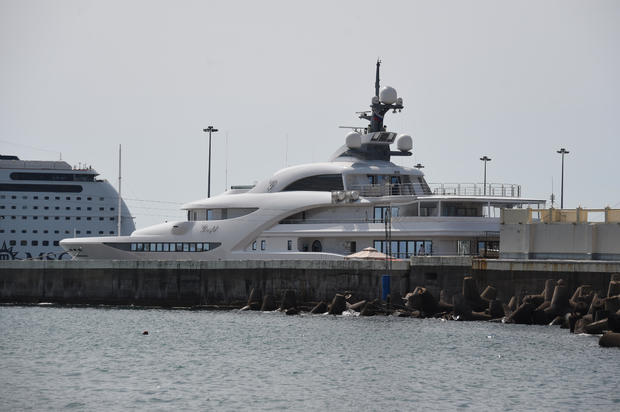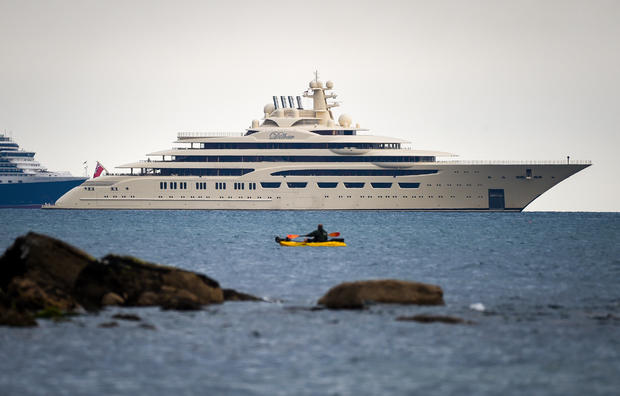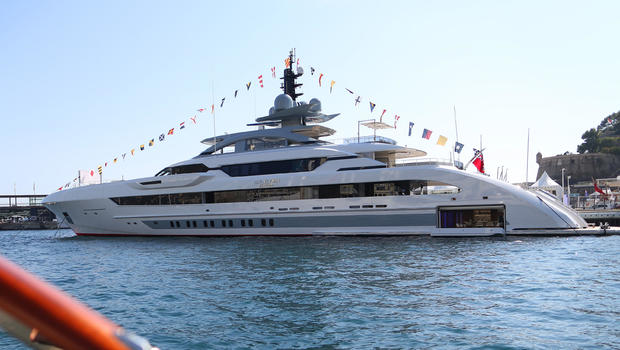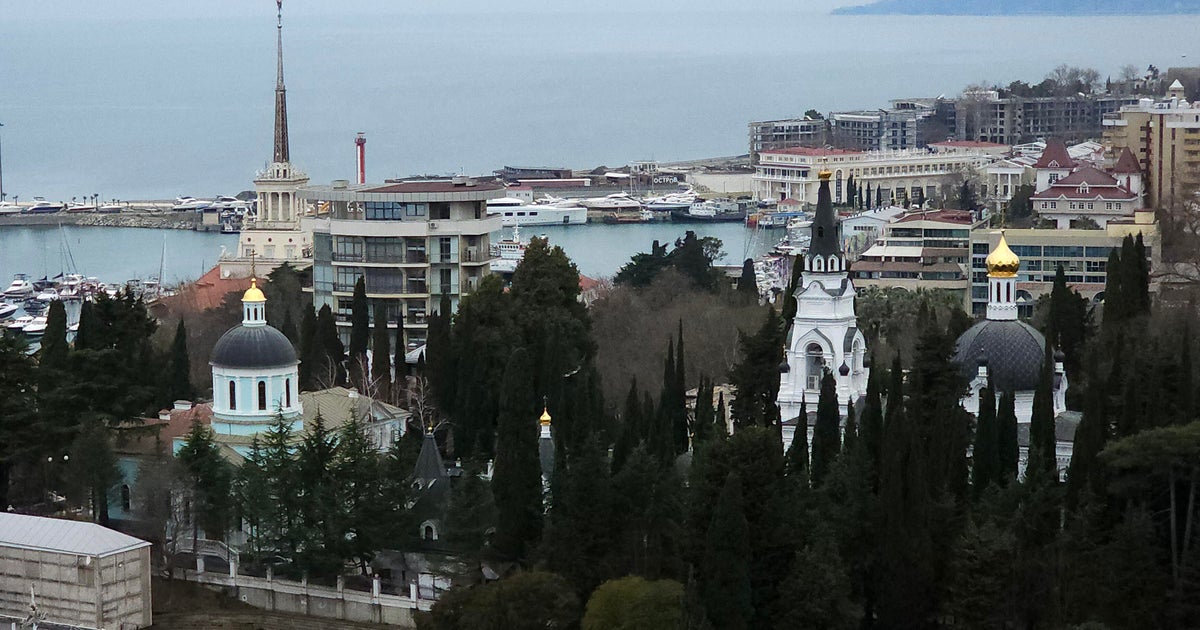West hits Russian oligarchs where it hurts — their mega-yachts
The U.S. and European Union are cracking down on sanctions against Russian billionaires by taking control of their mega yachts and other valuable assets, including villas and private jets, parked in territory over which their governments have jurisdiction.
Italy on Friday said it seized a $70 million yacht moored in Liguria, Italy, belonging to Alexey Alexandrovits Mordaschov, a steel magnate with close ties to the Kremlin.
"Italy's police has just seized 'Lady M Yacht' - a €65 million yacht belonging to Alexey Alexandrovits Mordaschov located in Imperia (Liguria) - in compliance with the recent EU sanctions," Ferdinando Giugliano, a media adviser to Italy's prime minister, said in a tweet.
On Saturday, Italy's tax police also froze "Lena," a $54 million yacht belonging to Gennady Nikolayevich Timchenko, the founder of a Moscow, Russia-based private investment group and close friend of Russian President Vladimir Putin, whom the EU has sanctioned.
Assets that cannot be moved are even easier to take possession of, or prevent their owners from accessing.
Italy also froze a $3.2 million property in Tuscany belonging to Oleg Savchenko, who is among the richest Russian business people. Giugliano tweeted an image of a Ministry of Economy and Finance vehicle in front of the estate, named "Villa Lazzareschi."
President Biden has also said the U.S. government is homing in on Russian oligarchs' super-yachts, private planes and other conspicuous symbols of their wealth as Russian President Vladimir Putin escalates his country's attack on Ukraine.
A new federal task force, dubbed "KleptoCapture," will take aim at what Mr. Biden described in his State of the Union address on Tuesday as "the crimes of Russian oligarchs."
"We are joining with our European allies to find and seize your yachts, your luxury apartments, your private jets," Mr. Biden said. "We are coming for your ill-begotten gains."
More than a dozen Russian billionaires are under sanction by the U.S., European Union and the United Kingdom, and some are trying to dodge restrictions by moving assets that are mobile — including mega-yachts — into territories where sanctions don't apply and where their property cannot be seized or their assets frozen.
The super-yacht "Graceful," believed to be owned by Vladimir Putin himself, left Germany two weeks before Russia invaded Ukraine and recently docked in Kaliningrad, near Russia's nuclear weapons operations, data form MarineTraffic, a maritime tracking website, shows.
Putin ally Roman Abramovich, who made his fortune in the energy business, is not currently on any government sanction lists, but is making moves to unload valuable assets, including Chelsea Football Club. Among those assets is a super-yacht named "Eclipse" that is the third largest pleasure vessel in the world, measuring more than 540 feet long and 72 feet wide, according to Marine Vessel Traffic, a website that tracks the location of ships and other vessels, including privately owned yachts. It recently set sail from St. Barts to Philipsburg, the capital of Sint Maarten — the Dutch side of the Caribbean island Saint Martin.
"Le Grand Bleu," owned by Russian oil titan Eugene Shvidler, is also anchored off the island of St. Martin, where EU sanctions can be enforced.
Too big to hide
Some oligarchs on sanction lists, who are alleged to have built their wealth in Russia through political corruption, have already been cut off from their own valuable assets.
The EU's sanctions on Russian oligarchs on Wednesday led to Germany's freezing of a yacht owned by Alisher Usmanov, one of the wealthiest Russians, according to a Forbes report. According to Marine Traffic, the 512-foot yacht, named "Dilbar," had been stationed in Hamburg, Germany, since October 29 for repairs.
The French Ministry of Economy and Finance on Thursday said its customs agents seized the "Amore Vero" yacht belonging to a company owned by Igor Setchine, director of Russian oil company Rosneft. The yacht had been stationed for repairs in La Ciotat in Southern France's Cote d'Azur region.
While the crew's intention was to "sail urgently, without having completed the planned work," it was seized before it could depart, the agency said.
Fleeing hotspots
In hopes of avoiding the same fate, some yacht owners are "hightailing it on the high seas," financier and anti-corruption activist Bill Browder told CBS News senior investigative correspondent Catherine Herridge.
They are mooring their mega-yachts, some with 100-member-crews, in places like Dubai and the Maldives — a nation of tiny islands in the Indian Ocean, which does not have an extradition treaty with the U.S. "They're parking their assets where they cannot be seized," Browder told CBS MoneyWatch.
The problem is that ships of this size can't stay indefinitely in a place like the Maldives, which can generate significant income through docking fees, given their need to refuel and stock provisions.
"There are a number of these yachts in the Maldives, and unless those countries put sanctions in place they're probably safer there," Alasdair Milroy, a maritime accountant and owner of Breaking the Mould Accounting, told CBS MoneyWatch. "But you can only spend so long in someplace like the Maldives on a yacht of that size without needing provisions, or to refuel, so I don't know how well that will last for a longer period. I don't think they'll be able to do that for that long."
Deputy Attorney General Lisa Monaco, who is in charge of the new U.S. task force targeting Russian oligarchs, issued a stark warning: "We will use every tool to freeze and seize your criminal proceeds," she said in a statement.
Confiscating Russian oligarchs' wealth could be an effective tactic, Browder told CBS MoneyWatch. "It's hugely symbolic, and part of this thing is psychological war. This really has an impact — if not financially, then psychologically."
At least 10 of the 100 largest super-yachts in the world belong to Russian oligarchs, according to Marine Vessel Traffic.
Websites tracking maritime activity show that other oligarchs' yachts are on the move as their owners attempt to shield their assets from seizure. The "Galactica Super Nova," a 230-foot long, $80 million vessel owned by Vagit Alekperov, president of Russian oil company Lukoil, recently left its mooring in Barcelona, Spain, where EU sanctions apply, and set sail for Tivat, Montenegro, in the Balkans, according to VesselFinder.com.
"Clio," a super-yacht owned by Russian industrialist Oleg Deripaska, is currently anchored off of the Maldives, according to MarineTraffic.com. A handful of other oligarch-owned mega-yachts are also moored in the Maldives, including Alexander Abramov's "Titan," Viktor Rashnikov's "Ocean Victory" and Vladimir Potanin's "Nirvana."
How sanctions work
Placing an individual or their assets under official sanction does not give another government the legal authority to seize their assets — only to freeze or cut off their owner's access.
"Generally speaking, sanctions are the authority that allow us to freeze assets. They are most easily understood in context of a bank account — it's literally put into a frozen account that still exists and collects interest and you own it, but you can't get any money from it," said Adam M. Smith, a partner at law firm Gibson Dunn.
Tangible property must also be under the jurisdiction of the U.S. for any sanctions to work, or for the government to cut off their owner's ability to use an asset like a private yacht or jet.
Daniel P. Ahn, a sanctions and economic warfare expert at the Woodrow Wilson International Center for Scholars and former chief economist for the U.S. State Department, said that targeting an individual's yacht can limit its use even it isn't seized.
"If it arrives in the West, any port that can refuel is not allowed to do that anymore. So maybe the yacht itself doesn't get seized, but it's a lot less useful thing to have," he said.
For this reason, sanctioned individuals may choose to try to sell assets like yachts at a loss, rather than risk losing use of them indefinitely.
"If I was an oligarch, the first thing I would do is I would protest and say I shouldn't be blacklisted. Second would be to see if I can liquidate these assets and claw back something, knowing that otherwise it may rot at the pier without proper maintenance and the like," Ahn said.
As far as their impact goes, the sanctions are more than merely symbolic, he added. "The ultimate objective is to make life very difficult for these oligarchs, and it has been achieved," Ahn said.








